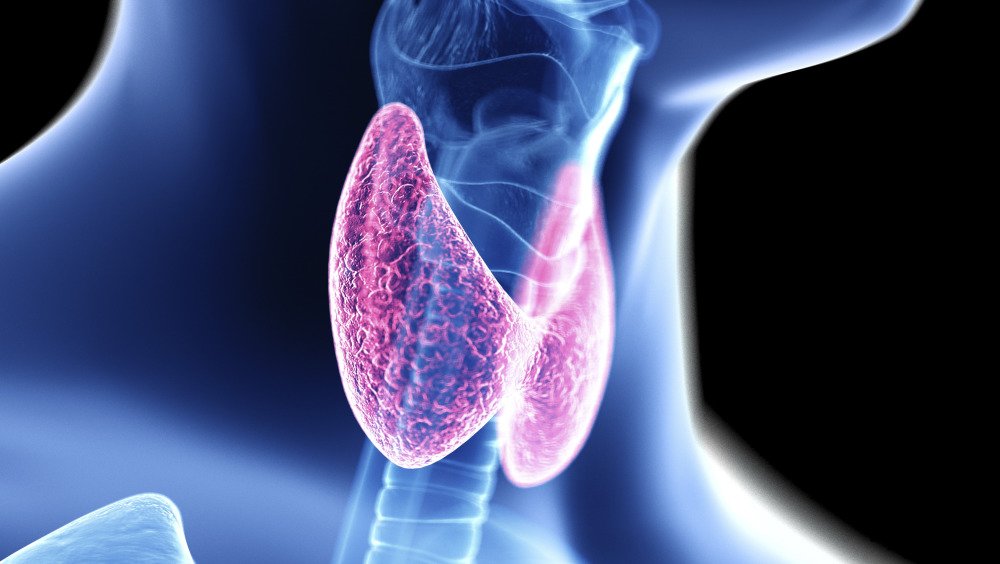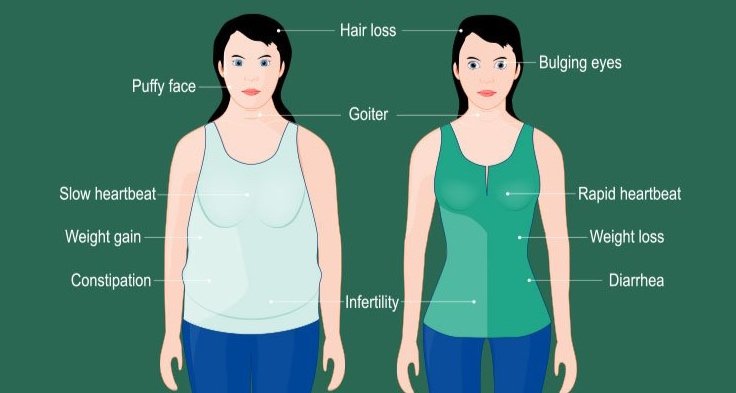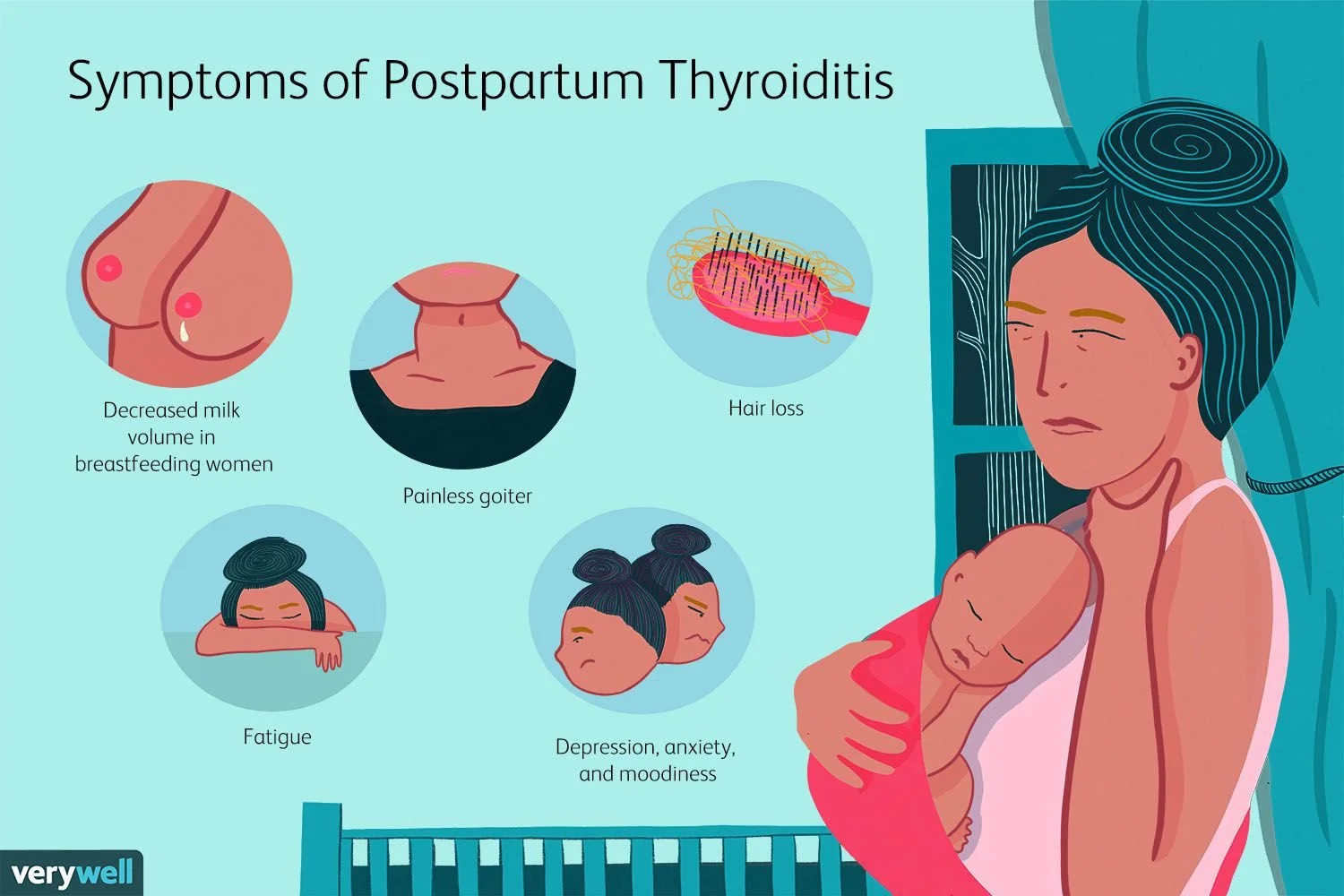The Thyroid Gland
For such a small part of the body it is remarkable the impact its activity (over activity or under activity) can have on the rest of the body’s workings. In this blog I will look at the most common problems we see.
What is tricky about the thyroid is that the symptoms are similar to those caused by many other medical problems, therefore it can sometimes be difficult to diagnose unless a test is administered. Many people can be suffering for a long time with an over or under active thyroid before seeking out their GP. I hope that this blog will inform you about the symptoms and when to seek help from your GP.
The Thyroid Gland
Your thyroid is a small butterfly-shaped gland found at the base of your neck, just below your Adam's apple.
This gland makes hormones that control your body's metabolism, including how fast you burn calories and how fast your heart beats.
One of its main functions is to produce hormones that help regulate the body's metabolism (the process that turns food into energy).
Diseases of the thyroid cause it to make either too much or too little of the hormone.
Many of the body's functions slow down when the thyroid does not produce enough of these hormones. Depending on how much or how little hormone your thyroid makes, you may often feel restless or tired, or you may lose or gain weight. Women are more likely than men to have thyroid diseases, especially right after pregnancy and after menopause.
Underactive thyroid
An underactive thyroid gland (hypothyroidism) is where your thyroid gland does not produce enough hormones.
The only accurate way of finding out whether you have a thyroid problem is to have a thyroid test, where a sample of blood is tested to measure your hormone levels.
You should see a GP and ask to be tested for an underactive thyroid if you have symptoms including:
tiredness
weight gain
depression
being sensitive to the cold
dry skin and hair
muscle aches
There's no way of preventing an underactive thyroid. Most cases are caused either by the immune system attacking the thyroid gland and damaging it, or by damage to the thyroid that occurs during some treatments for an overactive thyroid or thyroid cancer.
An underactive thyroid can often be successfully treated by taking daily hormone tablets to replace the hormones your thyroid is not making.
Who's affected by an underactive thyroid?
Both men and women can have an underactive thyroid, although it's more common in women. Children can also develop an underactive thyroid and some babies are born with it.
All babies born in the UK are screened for congenital hypothyroidism using a blood spot test when the baby is about 5 days old.
One in eight women will develop thyroid problems during her lifetime.1 In women, thyroid diseases can cause:
Problems with your menstrual period. Your thyroid helps control your menstrual cycle. Too much or too little thyroid hormone can make your periods very light, heavy, or irregular. Thyroid disease also can cause your periods to stop for several months or longer. If your body's immune system causes thyroid disease, other glands, including your ovaries, may be involved which can then lead to early menopause.
Problems getting pregnant. When thyroid disease affects the menstrual cycle, it also affects ovulation which can make it more difficult to get pregnant.
Problems during pregnancy. Thyroid problems during pregnancy can cause health problems for the mother and the baby.
Sometimes, symptoms of thyroid problems are mistaken for menopause symptoms. Thyroid disease, especially hypothyroidism, is more likely to develop after menopause.
Treating an underactive thyroid
Treatment for an underactive thyroid involves taking daily hormone replacement tablets.
You'll initially have regular blood tests until the correct dose of levothyroxine is reached. This can take a little while to get right. Once you're taking the correct dose, you'll usually have a blood test once a year to monitor your hormone levels.
You'll usually need treatment for the rest of your life. However, with proper treatment, you should be able to lead a normal, healthy life.
If an underactive thyroid is not treated, it can lead to complications, including heart disease, pregnancy problems and a life-threatening condition called myxoedema coma (although this is very rare).
Overactive thyroid
An overactive thyroid, also known as hyperthyroidism or thyrotoxicosis, is where the thyroid gland produces too much of the thyroid hormones.
Having too much of these hormones can cause unpleasant and potentially serious problems that may need treatment.
Symptoms of an overactive thyroid
An overactive thyroid can cause a wide range of symptoms, including:
nervousness, anxiety and irritability
mood swings
Problems sleeping
persistent tiredness and weakness
sensitivity to heat
swelling in your neck from an enlarged gland
an irregular and/or unusually fast heart rate
twitching or trembling
Weight loss
An overactive thyroid can affect anyone, but it's about 10 times more common in women than men, and typically happens between 20 and 40 years of age.
Your GP can arrange for a blood test to check how well your thyroid is working. If the blood test shows that you have an overactive thyroid, you may be referred for further tests to identify the cause.
Treatments of an overactive thyroid
An overactive thyroid is usually treatable.
The main treatments are:
medicine that stops your thyroid producing too much of the thyroid hormones
radioiodine treatment – where a type of radiotherapy is used to destroy cells in the thyroid, reducing its ability to produce thyroid hormones
surgery to remove some or all of your thyroid, so that it no longer produces thyroid hormones
Each of these treatments has benefits and drawbacks.
You'll usually see a specialist in hormonal conditions (endocrinologist) to discuss which treatment is best for you.
Causes of an overactive thyroid
There are several reasons why your thyroid can become overactive.
These include:
Graves' disease – a condition where your immune system mistakenly attacks and damages the thyroid (about 3 in every 4 people with an overactive thyroid have Graves' disease)
lumps (nodules) on the thyroid – this extra thyroid tissue can produce thyroid hormones, causing your levels to be too high
some medicines such as amiodarone, which can be used to treat an irregular heartbeat.
Further problems of an overactive thyroid
An overactive thyroid can sometimes lead to further problems, particularly if it's not treated or well controlled.
These include:
eye problems – such as eye irritation, double-vision or bulging eyes.
pregnancy complications – such as pre-eclampsia, premature birth or miscarriage.
a thyroid storm – a sudden and life-threatening flare-up of symptoms
Why choose Vitalis for problems with your thyroid?
Dr Siobhan Graham is highly experienced in supporting people with over and underachieve thyroids. If you are concerned about the symptoms you have which could be linked to an under or overactive thyroid then book an appointment at Vitalis Health private GP in Belfast City Centre. If you phone our clinic you can speak directly to a member of our team. This is particularly valuable today when it is nearly impossible to speak to NHS doctors due to their excessive workload. For peace of mind why wait, book a private appointment today.






